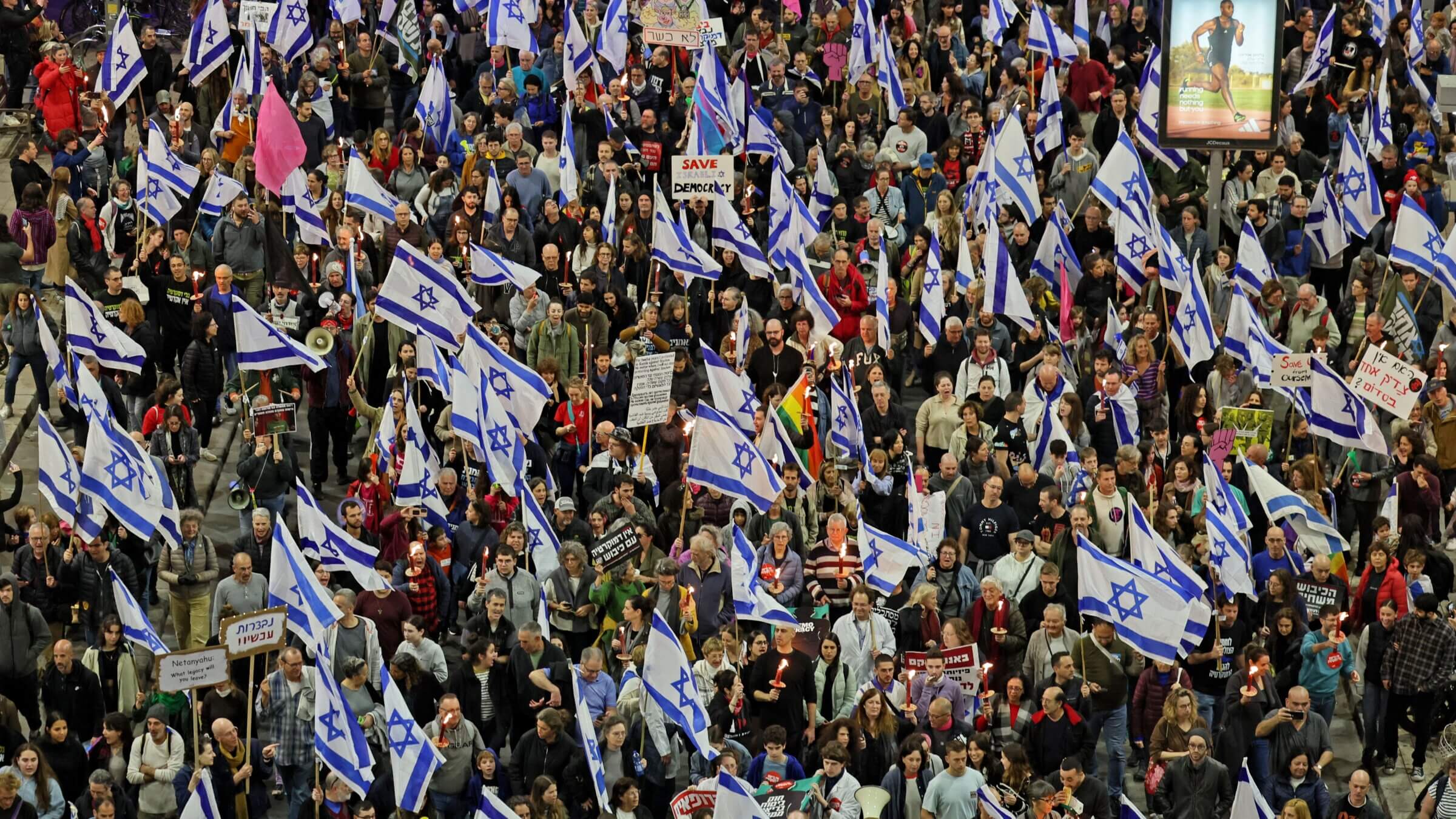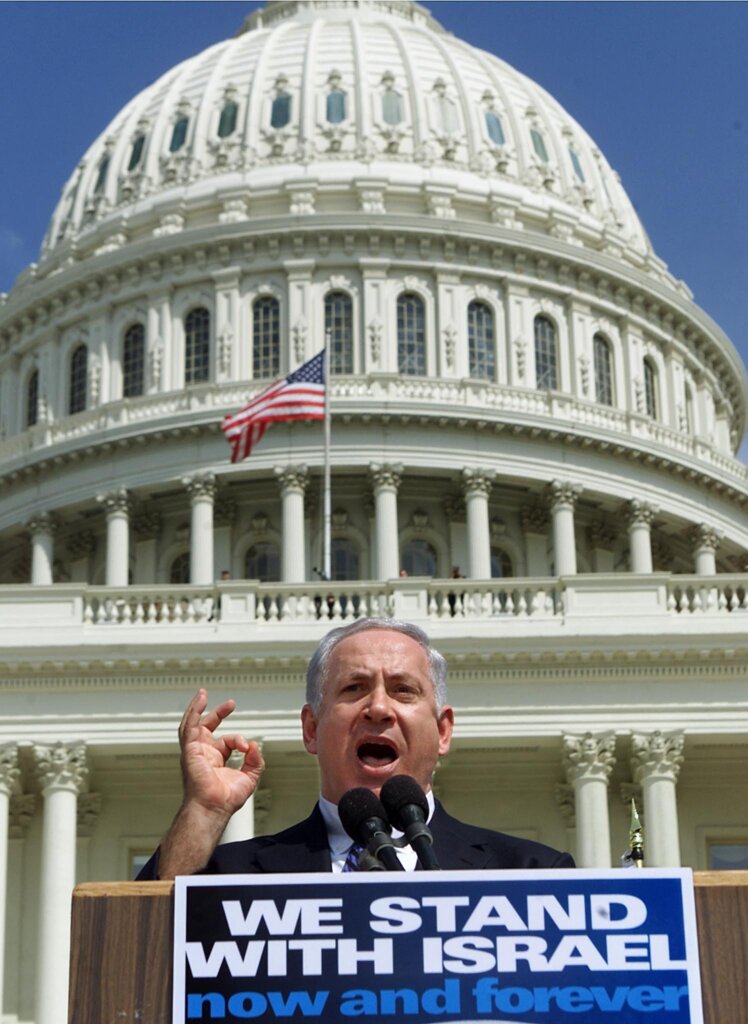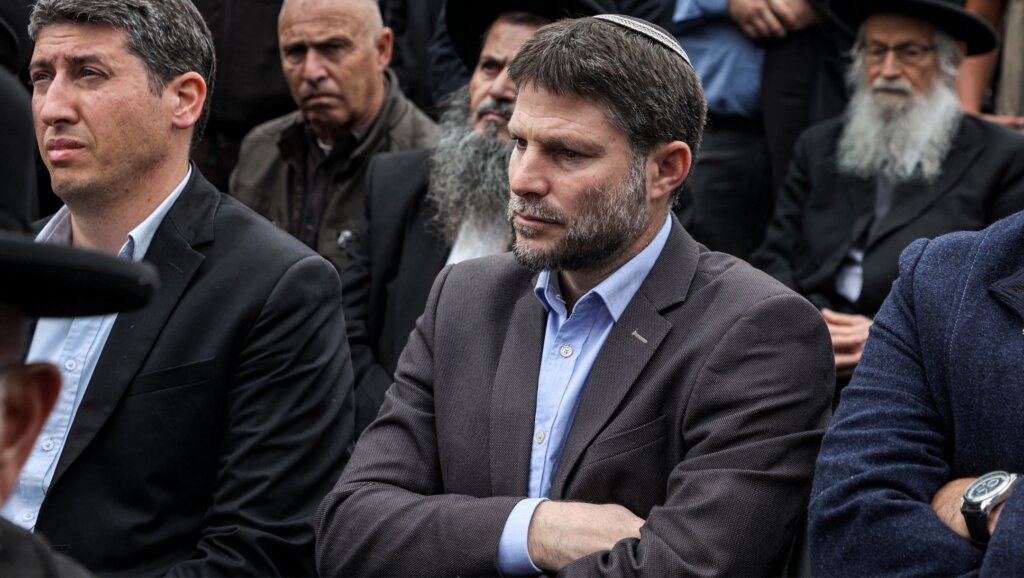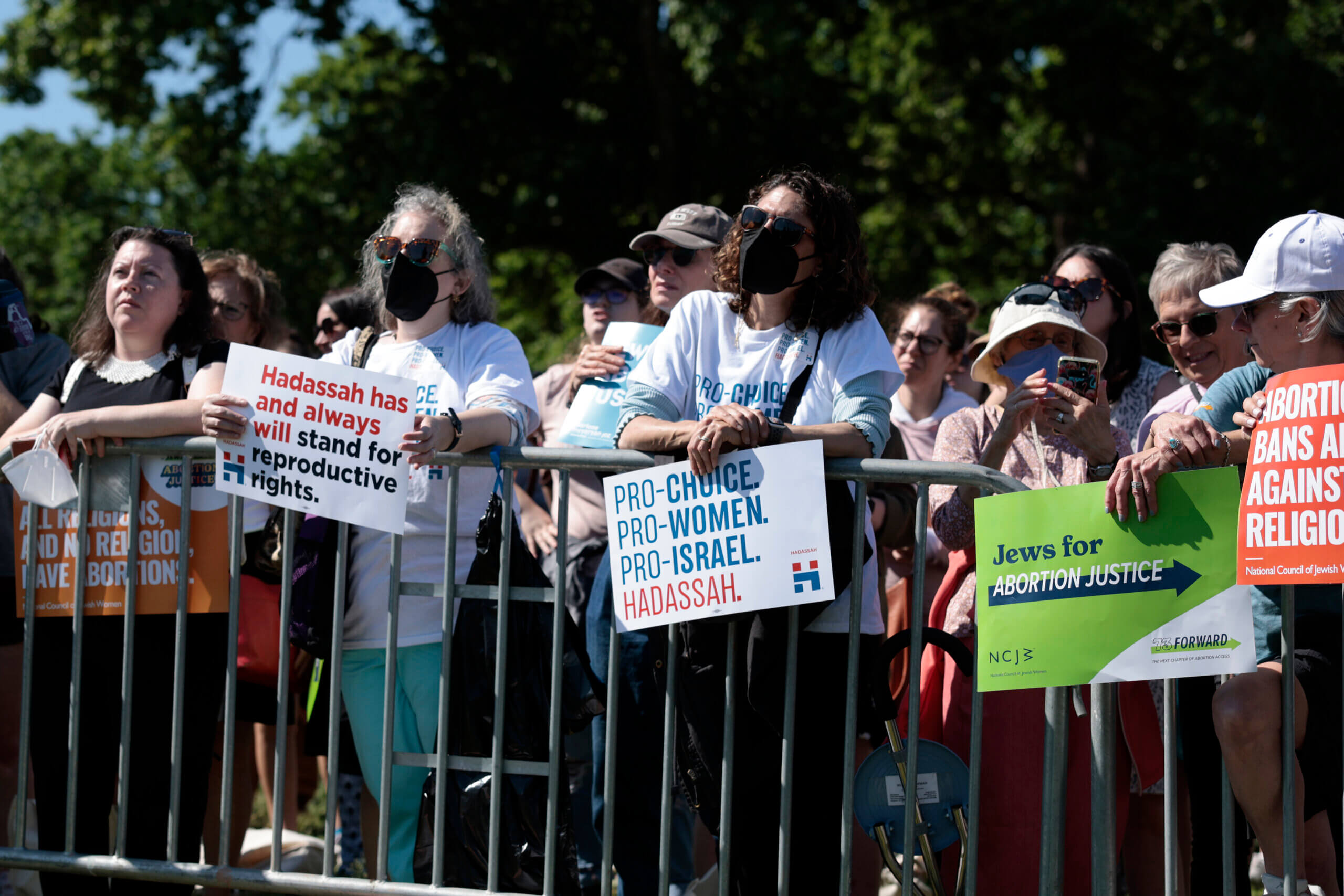Why more American Jews aren’t protesting about Israel right now
The American Jewish crowds, compared to many past protests and rallies, have been relatively small

Hundreds of thousands of Israelis, like those gathered above in Tel Aviv, have turned out across the country to protest changes to Israel’s supreme court. While many American Jewish leaders have spoken out against the legal reforms, organizers have had trouble mustering large crowds to protest in the United States. Photo by Getty Images
On paper, at least, the American Jewish community is agonizing over the Israeli government’s recent behavior. National organizations known for ferociously defending Israel are now publicly criticizing it over proposed changes to the judicial system. Rabbis, too, have sermonized against those reforms and new extremist cabinet ministers. And dozens of prominent Jewish leaders came out against a planned visit by one of those ministers, Bezalel Smotrich, in a scathing open letter this month.
But where Israel has been convulsed by massive street protests over these issues — it is estimated that more than 250,000 Israelis have turned out across the country — Jews in the United States have shown no such appetite.
A few hundred demonstrated in San Francisco two weeks ago. At the Israeli consulate in New York City last month, a couple hundred protesters showed up to wave signs. And that demonstration followed a similar event, and similar-size crowd, in January at the Israeli embassy in Washington, D.C. Organizers are hoping for a larger showing outside the Washington hotel where Smotrich will address the Israel Bonds conference Sunday evening, but estimates are still in the hundreds.
It’s not like American Jews don’t know how to demonstrate in large numbers. Hundreds of thousands marched and rallied for Soviet Jews during the 1970s and 1980s, and massive crowds have turned out in defense of Israel. In 2002, around 100,000 Jews descended on Washington for the National Rally in Solidarity with Israel.
But it has been much more difficult to turn Jews out to protest Israel, as witnessed by the relatively small demonstrations in recent weeks.
“The vast majority of the American Jewish collective galvanizes itself in solidarity with Israel,” said Scott Lasensky, who advised the Obama administration on Jewish issues. “It goes against the DNA of the diaspora political culture to protest Israel or the sitting Israeli government.”

Though they have spoken out against the judicial reform and Smotrich’s incendiary comments about wiping out a Palestinian village, major establishment organizations like the American Jewish Committee, Anti-Defamation League and Jewish Federations of North America, aren’t lending their stamp of approval to any protests.
At the same time, the people who normally protest Israel — largely Palestinian organizations and their allies — don’t care much about preserving Israel’s democratic institutions, which they tend to view as hopelessly corrupted by decades of Israeli occupation in the West Bank.
“The presupposition that there’s a democracy that’s under threat is, actually, we think inaccurate,” said Sonya Meyerson-Knox, a spokesperson for the anti-Zionist Jewish Voice for Peace, pointing to the experience of non-Jewish citizens of Israel and Palestinians in the West Bank and Gaza.
With many major national Jewish organizations keeping the protests at arm’s length, and the most strident left-wing activists groups not fired up about judicial reform, it can be a struggle to drive turnout.
Hadar Susskind, director of Americans for Peace Now, which has organized several Washington protests, acknowledged a complicated balancing act. His organization has framed the judicial reform as a symptom of the occupation and emphasized that the erosion of Israeli democracy will only make things worse for the Palestinians.
“The things that were bad before are still horrible and still need to be dealt with,” Susskind said in an interview. “But you can make the analogy to the Trump years: Don’t make it worse.”
Fractured movement
All this complexity has led to a fractured protest landscape in the U.S. The largest demonstration so far is planned for Sunday outside the Washington hotel where Smotrich, the Israeli finance minister, will be addressing the Israel Bonds conference. It is drawing groups focused on Israeli democracy and the judicial overhaul, as well as those angered by Smotrich’s racist views toward Palestinians and recent call to destroy the Palestinian village of Huwara following a terrorist attack. (Smotrich subsequently apologized and claimed his remarks had been misinterpreted.)

But the protesters aren’t exactly working together. Americans for Peace Now is sponsoring the main demonstration, along with 11 other groups, including J Street, T’ruah and the Reconstructionist movement. A movement of Israeli expatriates who oppose the judicial changes will be protesting at the same time, and place, but intentionally secured their own permit. Offir Gutelzon, founder of that group, called Unxeptable, said they wanted to avoid turning off people who don’t support the other organizations.
“We’re intentionally having an UnXeptable protest and a peace protest,” Gutelzon said. “It’s separate.”
The Union for Reform Judaism is sending a speaker to the UnXeptable event, while the Reconstructionist movement endorsed the Americans for Peace Now event.
Meanwhile, Jewish Voice for Peace, which is shunned by the Jewish establishment, has encouraged its members to show up outside the hotel where Smotrich is speaking, but isn’t sponsoring the main protest. “We’re not coordinating with them,” Susskind said.
Meyerson-Knox, with JVP, said her organization viewed the protest in part as an opportunity to encourage people to join the movement to boycott Israel. She said that JVP members were extremely motivated to demonstrate as a result of escalating violence against Palestinians in the West Bank. “This is a moment for action,” Meyerson-Knox said.
And IfNotNow, another left-wing group focused on opposing the occupation, is organizing its own march to the hotel from the White House.
Always a challenge
Topping off the challenges of organizing a mass demonstration against the Israeli government in the current moment is that — despite past successes — it’s actually not easy to turn people out for Jewish protests even when there is consensus within the community.
The National Council of Jewish Women organized the Jewish Rally for Abortion Justice outside the Capitol last May following the leak of the Supreme Court decision overturning Roe v. Wade. The event was sponsored by many of the largest Jewish organizations in the country and had the benefit of representing the views of more than 80% of American Jews. It drew between 1,500 and 2,500 demonstrators, which made it one of the largest Jewish rallies in recent decades, but small compared to the largest such events.

Three Jewish gatherings have drawn crowds estimated at around 250,000 people — but none in the past 35 years.
The first was a 1933 protest against Nazi book burnings in New York City, which was matched by a 1945 march in the city demanding the creation of a Jewish state in Palestine. Jewish crowds did not reach that size again until the 1985 Solidarity Sunday for Soviet Jews outside the United Nations. Many of the Soviet Jewry protests, including the largest, benefited from being annual events, which eased coordination among Jewish groups. And they were backed by a broad swath of American — and Israeli — politicians. “Czarist anti-Semitism was a child’s play compared to that of the Soviets,” Benjamin Netanyahu, the current Israeli prime minister and target of the current protests, told the New York City crowd nearly four decades ago.
Nobody is predicting six-figure attendance at any of the American protests against the Israeli government. But Gutelzon said he was heartened to see rabbis and Jewish organizations increasingly comfortable endorsing UnXeptable events and believed momentum behind the diaspora protests was growing.
“For many, many years people were educated that standing with Israel is something you have to do no matter what Israel does,” he said. “Now they’re all understanding that the contract we all have with Israel — not just with the Israeli government — is for a Jewish and democratic state.”

















